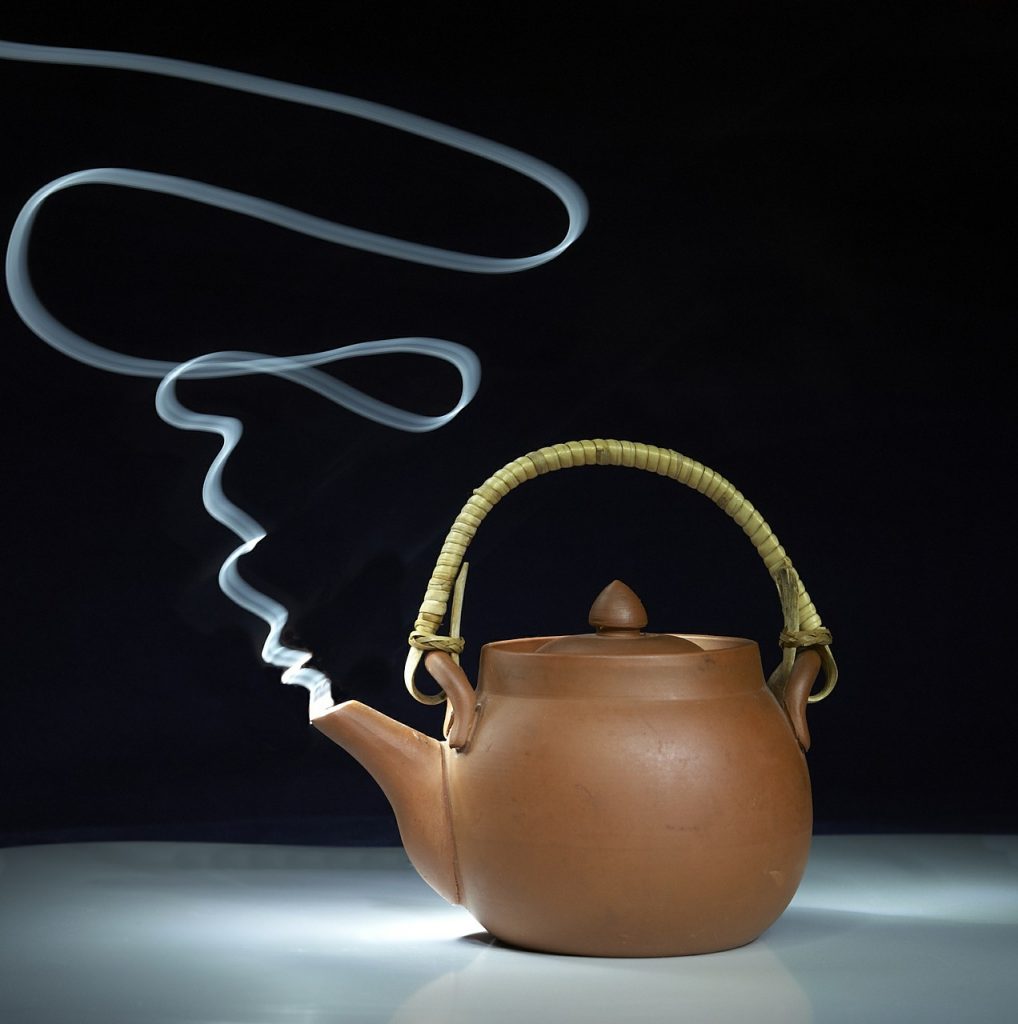It’s Tea Time! Posted by Gary Locke on May 12, 2017 in Culture, English Language

Tea is the beverage most closely associated with the English, so it is no surprise that the English language is filled with idioms and terms related to the humble, delicious brew. Let’s explore the curious case of tea and English speakers.
I am a tea drinker. I rarely drink coffee, never drink sodas (or, as they are called in other parts of the U.S., soft drinks or pop), and I probably only have one mug of hot chocolate a year. But I love my tea. A large mug of black tea cut with a squeeze of lemon begins my day, an even bigger travel mug of it accompanies me to work, and there is bound to be a refill after lunch. I also think that tea is the perfect finish to a satisfying meal. I drink iced tea (cold tea over ice) throughout the late spring and summer, give fine tea as gifts, and I’m always willing to try a flavor or brand that I’ve never had before.
This obsession began when I took a college semester in southern England. While coffee was available, tea was everywhere. If I visited a home, my host always, “Put the kettle on.” I was often invited to join someone “For a cuppa.” And I learned the hard way that the British like their tea on the strong side. I once spent hours waiting to see a doctor at the NHS (National Health Service) because of severe stomach pain. Within seconds of finally meeting him, the doctor asked me if I drank my tea with milk.
“No,” I told him, finding the question rather odd. “I always drink tea with just a little lemon.”
“Drink your tea in England with milk and you won’t have stomach problems.” He then indicated that we were done by opening the door for me. “Thank you. Good day.”
And, he was right.
Tea Comes to Britain and America
Tea came to England in the 17th century, brought to London by Portuguese and Dutch traders. Oddly enough, it was originally sold in coffee houses, marketed as a more healthful alternative to coffee, ale, and gin. By 1700, tea was considered fashionable and refined, and it soon became a primary commodity for English traders and shippers. By the mid-18th century tea was also heavily taxed, by a whopping 119% at one point, which triggered one of history’s most notable events.
The British Parliament’s tax on tea prompted colonists in Boston to stage a protest which came to be known as The Boston Tea Party. Outraged by tariffs imposed upon them by a distant government, and without any locally elected representatives of their own, the colonists boarded ships from the East India Tea Company and tossed chests full of tea into Boston Harbor. This act of defiance did not set well with England’s Parliament, which responded with a set of rules in 1774 known as the Intolerable Acts. Among other things, these laws resulted in the closing of Boston’s ports and ending any self-governing bodies in the Commonwealth of Massachusetts. The American Revolution began shortly thereafter.
Tea Idioms
There are several expressions about tea which have found their way to common usage, and one of them refers to the Boston Tea Party and the beginnings of the American Revolution.
- Tempest in a teapot
If something is all just a tempest in a teapot it means that something has been a big fuss over nothing, or that an issue has been blown out of proportion. Sometimes the phrase is changed to a tempest in a teacup, or a storm in a teacup. While the idiom dates its roots as far back as the writings of Cicero in the 1st century BC, the British press enjoyed poking fun at the revolt of the American colonies, and what they saw as Parliament’s overblown response to the events in Boston Harbor. With typical English wit, they called it a tempest in a teapot.
- That’s not my cup of tea
This means that something is not to your liking, and dates to around 1920. It is more commonly used today over the more positive expression of pleasure, that is my cup of tea, which dates to the late 19th century. Also: Now, that’s more my cup of tea!
“I’m going with some friends to a square dance tonight. Would you like to join us?”
“Oh, sorry, but that sort of thing really isn’t my cup of tea. Thanks anyway!”
- Not for all the tea in China
This phrase probably has roots in the 18th century, and means that you wouldn’t do something under any circumstances. Considering the historical value of the tea trade from China, if you wouldn’t do something for all the tea in China, you would be giving up a vast amount of wealth.
“I wouldn’t go out with him for all the tea in China!”
- What does that have to do with the price of tea in China?
This is a great expression, meaning that someone has just said something which doesn’t have anything to do with the subject being discussed. It is a facetious phrase, indicating that the topic under discussion might as well be the price of tea in China. It probably also dates to the 18th century, when the current price of tea in China was most relevant to a larger percentage of the English populace.
“Don and I have been doing all the talking about our views on Congress. What do you think, Greg?”
“I just like to read poetry.”
“Huh? What does that have to do with the price of tea in China?”
Now, if you’ll excuse me, I must brew up a cup of Earl Grey.
Do you have any favorite idioms or phrases about tea?

Build vocabulary, practice pronunciation, and more with Transparent Language Online. Available anytime, anywhere, on any device.



